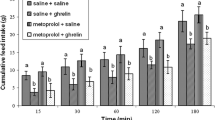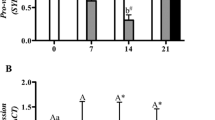Abstract
The objective of this study was to determine the effect of modulating the plasma concentrations of the avian antidiuretic hormone, arginine vasotocin (AVT), upon the febrile response to lipopolysaccharide (LPS) in Pekin ducks. LPS, intravenously administered into conscious control birds at a dose of 1 μg · kg−1, caused a monophasic increase in body temperature of 0.85 ± 0.12 °C associated with a Thermal Response Index of 2.5 ± 0.6 C° h. Plasma AVT concentrations in the control birds also increased with the progression of the fever response, more than doubling from their basal values. Ducks in which the circulating level of AVT had either been elevated by the intravenous infusion of the peptide or dehydration, or reduced by the administration of a specific AVT antibody prior to LPS administration, produced body temperature profiles and Thermal Response Index values that did not differ significantly from those of the control birds. The lack of any direct effect of variations in plasma AVT concentrations upon the magnitude of the fever response indicates that the LPS-induced elevation in plasma AVT is not associated with modulating the rise in body temperature obtained in avian fever.
Similar content being viewed by others
Author information
Authors and Affiliations
Additional information
Accepted: 7 March 2000
Rights and permissions
About this article
Cite this article
Gray, D., Ironside, C. & Maloney, S. Modulation of plasma antidiuretic hormone levels does not change the magnitude of the LPS-induced febrile response in Pekin ducks. J Comp Physiol B 170, 315–320 (2000). https://doi.org/10.1007/s003600000105
Issue Date:
DOI: https://doi.org/10.1007/s003600000105




